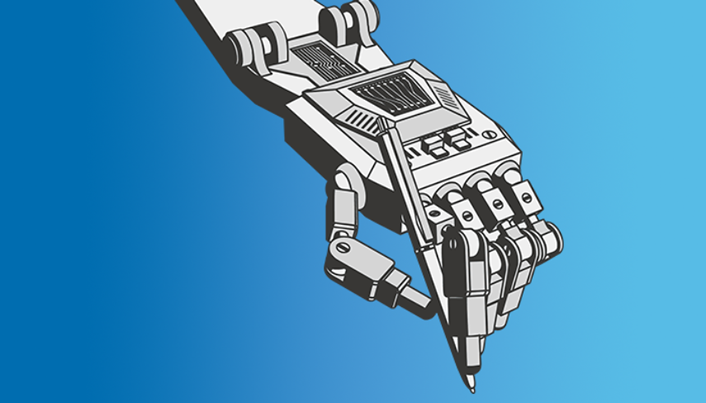
Beware journalists, academicians, and book publishers: an intelligent Wikipedia is coming for you.
That might not be the exact warning Kyle Bowen, director of educational technology services at Penn State, would offer to the media. But it isn’t too far from the capabilities he’s been working on as part of a research team on machine learning and open educational resources (OER). Bowen is part of a team that has developed algorithms for computers to learn how to write textbooks by extracting factual information. He notes that in smaller ways, this technology is currently in play.
“We’re already dealing with machine-written pieces,” Bowen says. “When you check out college sports news or browse business briefs online, what you’re reading has often generated by computers.”
When you think about the tedium of updating factual information that frequently changes, it makes sense that a computer ought to be able to pull those figures and share them in a coherent way.
He followed this by offering an especially mind-bending question: if a machine writes a textbook or other resource, who is the author? And just who owns the copyright if the final deliverable qualifies as a derivative work? (If the material generated is completely factual, Bowen says, technically the answer is no one.)
The technology is very new, and to some, it comes across as downright futuristic. “But we’ve gotten to the point where we can say, ‘this is a real thing. We’re not making this up!’” Bowen added.
The single most exciting aspect for him, he explains, is accessibility. The advent of free or low-cost textbooks for underserved populations — especially within STEM fields, which advance so quickly that traditional books are typically out of date the moment they’re printed — is a very exciting prospect and, as Bowen puts it, ‘a powerful idea.’
On Monday, April 11, from 1:00 to 3:00 p.m. ET, he will lead Robot Writers and the Future of Open Education along with colleagues C. Lee Giles and Barton Pursel, in an EDUCAUSE Learning Initiative (ELI) webinar that explores an automated book creation platform they’ve developed at Penn State. The platform uses intelligent algorithms that search through OER repositories and return relevant resources that can be combined, remixed, and reused in the support of specific learning goals.
He cautions that this is only first generation technology, and expects much progress to be made as research teams like those at Penn State and others endeavor to expand upon the capabilities of human computing.
An academic tech evangelist, Bowen says that “machine-composed textbooks might be the least interesting option to consider in the next five years. Assessment is an area ripe for transformation from new technologies. We could even have entire learning spaces that adapt to suit the specific needs of faculty or students. The possibilities are in some ways beyond our current comprehension.”
In his current role at Penn State, Bowen oversees a portfolio of services for the university, including instructional design, faculty research support, learning spaces, digital media development, and the exploration of emerging technologies. His participation with the EDUCAUSE Learning Initiative has involved presenting at various Annual Meetings and virtual conferences, to serving on advisory and program committees, to authoring publications and leading webinars.
When asked why he continues to stay so connected to ELI, Bowen responded enthusiastically.
“For all the association has given to me regarding this grand challenge of incorporating tech into teaching and learning — this is the least I can do. The many ways I’ve been able to engage with this incredible community has helped me to formulate my own thinking on emerging technologies, and how they best work in certain academic contexts.”
He cited the many virtual and face-to-face opportunities as critical avenues for professional development. “More than ways to stay on top of evolving trends and research, ELI member events and its Annual Meeting are a way to continually shape your worldview, and be inspired by new concepts. ELI offers such a breadth and depth of programming that your experience can be intensely personal — as a liberal arts leader, an instructional technologist, a dean at a community college, or a faculty researcher in a large research university.”
“It’s exciting, also, to explore with others the overarching problems in higher education that may not be solvable. The pursuit of solving them in itself has such extraordinary value, even if the work is never finished.”
Naturally, it’s not just the research and pedagogical thinking, but the people within ELI’s community that keep Bowen coming back. “The connections I’ve been able to develop have been absolutely invaluable. I learn from others’ opportunities and challenges, within a diverse range of institutions that might be very similar to Penn State, or wildly different. In every situation, I’m learning and bringing knowledge back to my institution.”
“The Annual Meeting is like a learning technology holiday; you could say that the final day is akin to the last day of summer camp. It’s a sad parting, but the best part is that you’re a part of this broader community that crosses all kinds of disciplines and Carnegie classifications. And the conversations definitely continue after you leave.”
That forward motion, and the reverberation of important discussions and insights, makes ELI into more of a movement than an organization. Within it, Bowen says that he’s among ‘learning activists’ who are united to transform higher education.
Kristi DePaul is marketing manager, EDUCAUSE Learning Initiative (ELI) and Next Generation Learning Challenges (NGLC), at EDUCAUSE.
